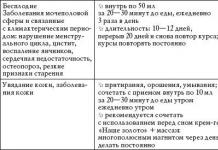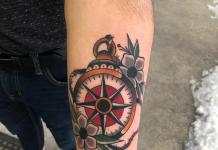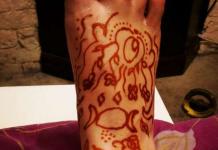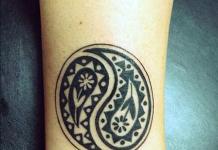One woman's husband died when she was young, and she had to raise four sons alone. The eldest son was not yet eleven years old at the time. During his lifetime, his father tried very hard and provided the family with everything necessary, and after his death, his mother took all the care. She devoted all her time to the care of children, their upbringing and provision. Mother worked day and night and endured all the hardships alone. During the day she worked, and in the evenings she cooked meals for the whole family. After midnight, she collapsed from fatigue and fell asleep, and then got up early in the morning to prepare breakfast, clothes and everything for the children. After making sure that everything was in order, she sent the children to school and looked forward to their return. She was ready to endure everything, looking at how her children were growing up.
So months and years passed in work and troubles, the children grew up, and the mother took care of them all.
Even after the children became adults, the mother continued to help them: she took on all the expenses for their education, clothes and food, and then looked for a job for them and helped them get married.
When she was over 60 years old, she was left alone. Hard work for many years did not pass without a trace, and she was paralyzed. Then the children got together and decided to look after their mother in turn. Over time, her health deteriorated and she stopped talking. The daughters-in-law treated her rudely and often said hurtful words, and she endured all these humiliations. In addition, the sons, whom she took care of from the day they were born until their marriage, when they had already become independent, instead of protecting their mother and taking care of her, began to shift responsibility onto each other. Their wives were not ready to take care of their sick mother, and the sons began to quarrel with each other, passing the mother to each other as a burden.
Once, when it was the turn of the youngest son, it turned out that he and his wife were invited to a party with friends. The son didn't want to miss the fun and didn't know what to do with his mother. He called his older brother and said that he had an appointment, and that he could not sit with his mother today, and that he would send his mother to him. Then the brothers began to swear, and the older brother said that he would not open the door if he brought her today. Despite this, the younger still brought his mother to his older brother at night. He knocked on the door for a long time, but the older brother did not open, then the younger one shouted loudly: “Your mother is sitting at the door, I leave her and go!”, and left.
Mother saw and heard everything. Tears streamed down her cheeks. She couldn't move or talk, and she couldn't do anything. No one opened the door and did not think about what it was like there for the mother: whether she wanted to drink, eat, sleep. And this is after so many years of hard work! In response, she received indifference and cruelty from her sons. So she sat at the door and remembered her life. She said to herself: “Are these my children, whom I loved so much, trying to protect them from all troubles. How many times they woke me up at night and asked for a drink or something. I rejoiced so much in their joys, and it hurt so much when they were hurt. Life passed like a moment, and I was left alone, cold and hungry ... ".
Today I met a friend at the clinic.
We haven't seen each other for four years. During this time, her husband died of a heart attack, her eldest son got married, and her daughter went to study in another city. Woman 42. Life has lost its meaning.
“I still couldn’t come to terms with the loss of my husband. No, I don’t wind myself up, I live, work, communicate. And men ask for friends. And I tried to start relationships with some, but it’s not that. I can’t learn to live with loss. And in the evening sometimes it gets so lonely, it hurts so much...
And I’m angry with myself that I didn’t say something important, somewhere I was offended in vain, I kept enduring the trip to the sea ...
And in my life there were the same lonely girlfriends, like me. Some husbands died, some husbands left when the children grew up, but they still suffer. Sometimes we laugh and say that we should start a young widows club. Somehow, several of these single women gathered at my place for tea. I invited a psychologist, with whom we talked for a long time. A very long time.
It was evident that not only we liked this conversation, but also the psychologist.
We came to the conclusion that with the loss of a husband, each of us lost about the same thing, and therefore we do not seek to create new relationships.
I'll tell you what I personally lost.
Communication. My husband and I talked a lot. They chattered incessantly. The children laughed and asked, when will we talk enough? And we reveled in conversations, like icy water in the heat ... We talked about everything; about books and films, about weather and nature, about harvests and flowers, about birds and children. It was interesting for us to discuss everything, to listen to the opinion, to listen to the voice of a loved one. No one can replace this communication for me, but I miss it so much.
Home warmth. I hurried home to cook something tasty for my husband for dinner, I always wanted to please him with something. Of course, I cooked for everyone, but my husband was always my guide. And on weekends she always baked something, and her husband cooked breakfasts and dinners on weekends. Always. Now I have no one to cook and bake for, and I don’t always feel like going home from work. That's why I often walk around the city. Just. No purpose. I go where we went together. I even remember what he told me in one place or another.
Exit "to the people". We loved to go to the cinema, to the theatre. in a cafe, on a visit, often hosted guests. Now it's gone. Widows are not guests.
But the guests somehow stopped walking. As my husband died, my friends stopped going, my colleagues too, I began to refuse. And then, after a year and a half, I realized that they didn’t invite me anymore, I tried to invite, but someone couldn’t, someone had family affairs, and someone had completely different plans.
Finance. I did not become poor, but my husband took care of all the financial issues of the family, he paid the bills, bought absolutely all the products, and made serious purchases. Now I myself have to learn how to manage all financial affairs.
Confidence. This is the most important thing that I have lost with the departure of my husband. This is what I'm missing now. I can’t talk to anyone so frankly, open up. I told my husband everything. I had no secrets from him, just as he had no secrets from me.
We talked about everything. It seems to me that neither my mother, nor my sister, nor my girlfriend could keep my secrets so securely.
And, you know, I noticed that those who, after the death of their husband or a serious divorce, did not find a second mate for themselves, cannot find trust in a new companion.
Well, what to do?
Life goes on and you have to live. You have to smile. The pain of loss will be if people were happy in marriage, but you should not suffer and withdraw into yourself, because there are so many unknown, unfelt around. There are so many things to love and admire... It's hard to be a happy person, but it's necessary."
Grandmother Katya... I lived with her in the same room from my early childhood until her death. Apartments changed, we moved to Moscow - she was always there.
Grandma's words come to mind:
- Well, again, everything was covered with “burobala” ... I told you - do not sit on the bed. For this, there are sofas and chairs, and here are stools in the kitchen ...
Grandmother's iron bed with "carapace mesh" was always beautifully furnished in a rustic way: pillows - peas, they have a lace cape, a "cane" white bedspread and a handmade "valance" - also lace. Before going to bed, she fluffed up the feather bed magnificently and slept as if on a white cloud.
As a child, I was very afraid that my grandmother would die like that in her sleep. Sometimes I woke up in the middle of the night and listened for a long time to see if she was breathing or not. This is probably the biggest fear of my childhood. My grandmother was 70 years older than me, and then it seemed to me almost an eternity. I remember how, having been discharged from the hospital after an eye operation, she said: “The doctor who treated me and says:“ Yes, you, Ekaterina Pavlovna, you will live up to 90 years old! ”Just kind words, but I believed in them joyfully and unconditionally, and calmed down - she stopped being afraid of her grandmother's imminent death.
My paternal grandmother, Ekaterina Pavlovna Zolotareva (nee Krestyaninova) was an illiterate, but worldly wise woman. As a child, I grew up under her supervision - in severity and order. Grandmother made sure that my brother and I had lunch and did homework so that I would not be late for music school and always taught “specialty” and “napkin” (as she called solfeggio). She braided my pigtails and sat on a bench at the entrance with her neighbors, while I was walking with my girlfriends in the yard.
Grandmother never raised her voice and did not cry, and if I suddenly started to roar, she calmly said: “Don’t “rock” (don’t cry) - a golden tear will not roll out,” and to make me laugh, she added: “This does not happen - a girl husband does not die.
She herself was laconic and very restrained in the manifestation of feelings, because she was already very many years old. And what new things could she see in this life, having survived revolutions, the Civil War, the Great Patriotic War ..., the death of loved ones ..., the birth of new grandchildren and great-grandchildren ..., moving, illness, small joys of life ...
My grandmother's eyesight was no longer good, but she always sat in the living room ("hall" - as she said) when we watched TV in the evenings. If they showed some kind of melodrama, she would say: “Love ... Some kind of love and what it is eaten with.”
Our neighbor at the entrance “Baba Dasha” - her friend, and at the same time a dressmaker - sewed dresses and aprons for her grandmother - always in a set, from the same fabric - I did not see anything like this on anyone later. While the eyes could see, my grandmother sometimes cooked. She was especially good at pies (my mother always admired the strength of her grandmother's hands - how she kneaded the dough: the pies then turned out to be simply extraordinary) and "loaves", and "brushwood" cookies, and soup with dumplings - "lordly", as she called it. And to my question: "Why "lordly?" - she began to talk about her life before the revolution, and explained that she cooked this soup to her hosts, for whom she had once served as a cook.
Sometimes I asked her: "Bah, well, tell me how they lived under the king." At first she brushed aside, saying that as much as possible about the same thing, but then imperceptibly immersed herself in memories, and her face at that moment became younger. Grandmother's speech was very juicy and figurative, and, in memory of my childhood, I use them myself on occasion with pleasure.
I took care of my grandmother when she hardly saw anymore. She helped to wash, wash her little things, made her look beautiful - she just told me: “Come on, “image” me. ”What a wonderful word - “image” - create your image - bring beauty! By the way, she has wrinkles there was almost none, and her posture was proud, which is how I remember her.
Of the entire large Zolotarev family, only I and my mother, Valentina Andreevna Zolotareva (nee Vashchenkova), her younger daughter-in-law, were interested in the past and listened to my grandmother's stories. I myself did not yet understand how important it was to know your past. Only thanks to my and my mother's memories I managed to recreate the life of Katya's grandmother.
She was born on December 24, 1890 in the village of Chembar, Shelukhov District, present-day Ryazan Region, in the family of Pavel Ivanovich and Elena Ivanovna Krestyaninov.
Chembar was a very large village with about three hundred houses. “All the houses in the village were heated in white,” my grandmother recalled, “only the house of Ivan’s grandfather (Elena Ivanovna’s father-in-law. - Auth.) - a cooper, where we first lived, was drowned in black, but it was necessary for business. He hung the whole hut under the ceiling with hoops for barrels and tubs - to smoke and dry.
The family of grandfather Ivan at that time was quite ordinary - several generations lived together, and the house was full of children. There were few sleeping places, and therefore armfuls of straw were brought into the hut at night, spread on the floor, covered with sackcloths, and they slept like that. In the morning the straw was burned in the oven. Grandfather Ivan, short, flimsy and always angry at something, did not miss the opportunity to hit one of the children with a hoop if they, having gone wild, started running around the house. But his wife was a stately, tall woman - strong and kind.
Later, their son Pavel Ivanovich (my great-grandfather) "stand out" and built his own house. Unlike the family of grandfather Ivan, his family was considered small: only two children - daughter Katya and son Methodius. So in the new hut they lived spaciously and well. Parents loved Katya very much, especially her father. Later, my grandmother often recalled the large state-owned forests surrounding Chembar, in which there were a lot of mushrooms and strawberries. This berry was the subject of a special trade - Chembar girls picked wild strawberries and sold them to harvesters, who sometimes came from St. Petersburg itself. Here, jam was cooked on the spot. This occupation was quite profitable - with the money earned during the season, the girls could collect a dowry for themselves.
When, at the age of 17, my grandmother was betrothed by the son of a neighbor, Philip Mikhailovich Zolotarev, born in 1886 (my grandfather), she was offended by her parents who agreed to the marriage. “Why so early? Yes, and according to the law, - said the grandmother, - it was still too early to get married: they went to the dean for permission to get married. Perhaps it was in the calculation - "calculation for a good person."
The calculation really turned out to be correct, and the marriage was successful. Philip took care of his wife all his life and felt sorry for his wife (the word "love" was rarely used in the countryside then). In moments of frankness, my grandmother told me that in bed he never turned his back on her, and if she turned away, he simply immediately lay down on the other side, only to see her face all the time. I remember my grandmother's stories about her wedding. On it, the young were not allowed to drink or eat, only when they came to the bedroom, only there they found a treat prepared for them - candied fruits and nuts, and fruit drinks - no alcohol (then they strictly monitored that there were no drunken conceptions ) - this is such simple worldly wisdom.
According to the then custom, the grandmother went to live with her husband. By this time, her older brother Methodius had already married, and together with his wife Natalya lived separately - in Bogorodsk, near Moscow, where he worked at a weaving factory.
When the children created their own families, grandmother's mother, Elena Ivanovna, frequented the pilgrimage. She suffered severely from migraine, and the medication did not help. There was only hope that the relics and holy places would heal her. On foot, she walked around half of Russia, visited the Trinity at Sergius of Radonezh, the Kiev-Pechersk Lavra and other holy places. From her last pilgrimage, she brought a three-year-old orphan girl, Maria, to her house. The great-grandmother's husband, Pavel Ivanovich, accepted the girl with a good heart. They raised her as their own daughter, later collected a dowry and married her.
Yes, at that time Philip did not yet have his own hut, and he brought his young wife to the house of his father, the widower Mikhail Ivanovich (his wife died of consumption). In addition to my grandfather, the family had two of his brothers who were married by that time - Grigory and Ivan, two still single - Maxim and Vasily, two sisters - the girls Matryona and Arina, and a hundred-year-old grandfather, whom everyone called "Turka", since he was a member of the Russian - Turkish war 1877 - 1878
.
Agriculture did not bring enough money for life, and therefore many villagers were engaged in various seasonal activities. The sons of Mikhail Ivanovich also had their own craft. The older sons, including my grandfather Philip, were engaged in dowsing. With the help of a vine, they searched for water, drilled artesian wells and, as my grandmother said, not only in Russia, but even in Turkestan.
Grandmother's father-in-law was a good host and a kind person: thanks to his wisdom and worldly experience, the family lived together. By that time, due to his age, he could not go fishing with his sons, and together with his daughters-in-law and daughters, he ran a household and was engaged in agriculture. The youngest son, Vasily, was still small at that time, and 18-year-old Maxim died of consumption, like his mother.
Soon my grandfather Philip Mikhailovich was taken into the army, where he served as a cavalryman in a hussar regiment stationed in Orel. The chief of the regiment was Grand Duke Konstantin Konstantinovich Romanov, who entered the history of Russian literature as a poet (he signed his works with the initials K.R.).
They served for a long time. Grandmother did not want to part with her husband and she followed him, fortunately, the case helped: the regimental priest was looking for a cook, and Philip offered his young wife for this job, who knew how to cook well. This was taught to her by her mother, Elena Ivanovna, who once served as a cook for the “forest master” (as the Chembarsky peasants called the local forester, who kept order in the state forest, under whose authority the entire forestry was located).
Grandmother recalled that the family of the priest was large - seven children: a young student, two schoolgirls and four boys. The youngest of them was just born, and the “mother” took care of the children. Grandmother was responsible for cleaning the house and cooking, and the laundry was washed by a visiting washerwoman.
In those days, religious fasts were strictly observed in peasant families. And on the first fast that came, after serving the usual breakfast, the grandmother herself sat down to eat, but unlike the hosts, she put only potatoes and herring on the table. This was seen by one of the priest's daughters. A little later, she called Katya to her father's office. He sat her in a chair and asked a question:
- Katya, are you an old believer?
– No, but we always keep fasts.
- Katya, fasting was invented by people and it is not necessary to fast.
Indeed, his family did not fast. The owners lived modestly. Help was the products that were brought from a small estate, inherited by the priest from his brother.
In 1912, grandfather was transferred to the reserve and returned home with his wife. Soon their son Pavel was born. I had to think about building my own house. But there was no place for him in Chembar, and Philip moved to the nearby village of Novo-Mosolovo - “to settlements”, where he built his own house. In the same place, in the neighborhood with him, grandmother's brother Methodius decided to settle. The house of Methodius was considered the most beautiful in the village - it was built of brick, which was a rarity in those days. True, there was no money for factory-made bricks, and they made and fired it themselves. This house still stands in the village. By the way, my grandmother's brother later almost suffered because of his house. During the years of collectivization, they wanted to exile him, like a fist, to Siberia, but nothing happened.
Since Methodius and his wife worked at a factory in Bogorodsk and his house was empty almost all the time, grandmother's parents with their adopted daughter moved there from Chembar - closer to their daughter and son-in-law.
Peaceful life did not last long. In 1914, the war with Germany began, and grandfather was called to the front, where he served as a signalman on the front line, was awarded the St. George Cross for courage and heroism. As grandfather himself said, he spent exactly 40 months in the war. From the stories of my grandmother, I especially remember the picture of grandfather returning from the front in the autumn of 1917. When, entering the house, he took the five-year-old Pavlik in his arms, he saw another - a curly-haired and blue-eyed baby of three years. Asked:
- Whose boy is this?
- This is your son, Vanechka, - answered the grandmother, - He was born when you were already at the front.
In life, of course, everything happened. Once my grandmother told me a story about how my grandfather, being with a family team in the field, almost fell in love. One of the daughters-in-law, who at that time went with her brothers as a cook, sent an urgent dispatch to her grandmother: “Katya, come, Philip went on a spree in earnest.” The grandmother left the children to their mother and went. Grandfather was surprised by her arrival and even angry. Another would, in place of the grandmother, rushed to cry, but from her - no reproaches, no questions - she missed her and that's it. He was like a couple of evenings somewhere, and calmed down. And the grandmother let her daughter-in-law go home and herself became a cook in the artel until the end of the season. So, without scandals and showdown, the family was saved.
After the war and the revolution, Philip and Catherine lived by hard peasant labor. In 1931, like everyone else, they joined the collective farm. During this time, my grandmother's son Nikolai was born in 1919, the twins Alexander and Anna were born in 1923, and my father Victor was born in 1925.
There was no school in Novo-Mosolovo, the nearest one was 15 miles from home, and the children had to live there in rented apartments with strangers. Therefore, in 1935 the family moved to Ramenskoye near Moscow. Here they lived on the outskirts, where there were still private houses. Grandfather worked first on the railroad, then as a simple worker in a local cooperative engaged in the production of confectionery. From work, he sometimes brought sweets to the children - halva and defective caramel - "landrin", as her grandmother called her. They lived in poverty. I had to rent a corner to students from a medical college. In order to have at least some additional income, in the evenings and weekends, my grandfather chopped firewood in the same cooperative. Grandma did housework. The main support for the family was a cow-nurse and a garden of 12 acres, which was located immediately behind the house. Yes, they lived very hard, but grandparents managed to “raise” all the children and bring them out into the people.
The eldest son Pavel began to serve in the police. He married early and lived separately with his wife and three children. He died in 1945 in Western Ukraine, where he was sent to fight in Bandera. Together with two other policemen from the detachment, he was ambushed. The details of his death were not known for a long time, only later it turned out that they were driven alive under the ice.
Ivan, who graduated from a communications technical school, was drafted into the army even before the start of World War II, and served in the Far East. From there, part of it was transferred to the front. Participated in the battle for Stalingrad, crossed the Dnieper, fought on the Kursk Bulge, in the battle for Berlin. He finished the war with the rank of major - commander of a separate battalion of government communications. He was awarded orders and medals, holder of the Order of Alexander Nevsky. After the war, Ivan Filippovich was the head of communications at the Flight Research Institute in Zhukovsky, worked on the construction of the Volga-Don Canal. Later he headed the communications department of the Ministry of Energy.
Nikolai, after graduating from the seven-year plan, went to work at the newly built Ramensky Instrument-Making Plant of the aviation industry. Together with him in 1941 he was evacuated to Izhevsk. Nikolay returned to Ramenskoye together with the plant at the end of the war. He worked on the construction of the first lines of long-distance telephone exchanges from Moscow to the Far East.
Before the war, Alexander graduated from 10 classes and was immediately drafted into the army, where he served in heavy artillery. After demobilization, he went to study at the Moscow State Institute of International Relations. But due to the tragic death of his elder brother Pavel, the circumstances of which were not fully clarified by that time, he was forbidden to work abroad. After graduating from the institute, Alexander was sent to Yuzhno-Sakhalinsk, where he participated in organizing the deportation of the Japanese from Sakhalin. Later he was at party work, taught English and history at a technical school, was a good lecturer in international affairs.
Anna graduated from a medical college, throughout the war she was a nurse in Ramenskoye (she had a daughter born in 1941 in her arms), and then moved to Moscow and worked until her retirement at the Krylya Sovetov aircraft engine plant as a control foreman.
My father Victor managed to finish 9 classes before the war. He worked at the Ramenskoye Instrument-Making Plant. Having a "booking", he volunteered for the front. He served in the Northern Fleet on the squadron destroyer "Grozny" (on the one where the future writer V. Pikul served as a cabin boy). Dad served in the Navy for 11 years. He finished his service as a company commander and a teacher of combined arms training at a submarine school - this was the abbreviated name for the S.M. Kirov is a large division that trained specialists for all fleets: hydroacoustics, radiometers, divers, etc. In the same place in Leningrad in 1954, he married my mother, Valentina Andreevna Vashchenkova (born in 1934). A year later, due to the reduction of the army, he was transferred to the reserve and returned with his pregnant wife to his grandmother's house (in the same year my elder brother Pavel was born to them). At that time, it was very difficult to get a job, and he was taken to an instrument-making plant as an electrician, i.e. to the same position that he left at the age of 16.
By the time my father returned to Ramenskoye, my grandmother had already been widowed - my grandfather caught a cold “on the labor front”, and died in 1943 from lobar pneumonia at the age of 56 ... Nevertheless, my grandmother did everything in her power to ensure that her younger son continued his studies. When he was fired from the army, it was she who wrote to him in Leningrad: "Vitya, they opened an institute in Ramenskoye - take your wife and return home - here the walls help." In parallel with work at the plant, Viktor began to study at the branch of the Moscow Aviation Technology Institute, which had just opened in Ramenskoye. In the spring of 1961, I was born, and in the same year they began to demolish the private sector in Ramenskoye. All my relatives who lived in my grandmother's house received separate apartments in five-story buildings, which would later be called "Khrushchev". Got an apartment and grandmother.
Despite the move, all relatives continued to live in the neighborhood. They lived on the same site in three apartments: Uncle Kolya with his wife Aunt Anya, my parents and I with my brother, and Uncle Vanya with his wife Aunt Lida and grandmother.
Soon, Uncle Vanya's family moved to Lyubertsy, and my grandmother invited my parents to move in with her, exchanging two apartments for one large apartment in the "Stalinist house". Until the end of her days, she lived with us - her grandmother died on January 3, 1981 at the age of 90 (as that doctor prophesied).
After graduating from the institute, my father began to work as a designer, deputy. department head, deputy chief inspector of the plant. Later, he was nominated to work in the Party Control Committee, for two years he was the chairman of the Ramensky city and district council, for six years he was the first secretary of the Ramensky district committee of the CPSU. In 1976 he was transferred to Moscow, where he became deputy. Head of the Main Directorate of the Gossnab, then director of the Promsvyaz plant in Pushkino, Moscow Region. He finished his career as a deputy. Director of the Research Institute of Automatic Systems of the Aerospace Industry. Now he lives in the village of Bykovo and is an honorary citizen of the Ramensky district.
My grandmother died a month before my already scheduled wedding, and I closed her eyes - it was the first death that I saw like this - up close. It would be necessary to postpone the wedding, and my mother was against it - it’s not supposed to be Christian. But the groom's parents insisted, and I agreed. The marriage eventually turned out to be unsuccessful, and almost two years before my divorce, my grandmother came to me in a dream and was very angry ... Now I understand that it was impossible to go against traditions. Apparently, my grandmother wanted to warn me about something ... But this understanding came to me later.
And today I want to say:
“Grandma, I always remember you and understand as never before that in a family, the old and the young should always be there - the children grow up kind and caring because of this, and the old people do not feel lonely and they have something to say and pass on to the children. Mutual assistance and respect are the foundation of every family.
When the husband dies
“Staring at the ceiling, counting dreams of you at midnight ...”
Gail Godwin wrote: “It was so quiet after he left; the music ceased, and his voice was not heard. As I read this passage, I feel a burning longing. Although I ardently desire solitude and silence, they would be a very difficult part of losing a husband.
Grief is the most difficult state of all possible. Even if you have cared for a chronically ill husband for many years, you may be emotionally unprepared for his death. When this event comes, we are very rarely, if ever, ready. We hope for a miracle.
It is very difficult to accept this fact. Andrea, my client, recalls the night the day after her husband's funeral: “I couldn't sleep, so I spent half the night cleaning the kitchen. I said the word 'widow' out loud to myself, feeling its bitter taste in my mouth. Even though I have been preparing to say this word for two years, since I learned about the diagnosis of leukemia, it has been hard to pronounce it. Brenda, my 61-year-old client, told me that for the first year and a half after her husband's death, she couldn't concentrate enough to read the entire newspaper article: “I couldn't concentrate. When someone you love dies, a part of you dies with him. It's been three years now, and I feel like I'm just now starting to think."
About 50% of women over the age of 65 are widows. About 85% of wives outlive their husbands. Nevertheless, millions of women left without husbands live quite well. In fact, women do better when they are single than men. Although the loss of a spouse is one of the most stressful moments, in the long term, most older women find widowhood a positive transition to a new phase of their lives. They want to be masters of their own destiny again, to test the skills they have acquired in the course of life, to experience the new feelings of strength and self-confidence that maturity can bring.
My friend Barbara told me: “The death of my husband was and continues to be the most defining moment of my life. I am the same person, but now I know how strong I am." Some women begin to enjoy the period of celibacy as soon as the sharpness of grief abates. Seventy-two-year-old Liz told her story: “My husband died of a heart attack. We've been married for 41 years... I still feel lonely at times, but I've made new single friends and the taste of life has returned to me."
If you choose perpetual grief as a way of life, your husband remains, as it were, responsible for your well-being. Another danger is putting your dead spouse on a pedestal, whereby only the good things will be easily remembered, and this can go on forever, and no one will live up to him. You can use this point of view as an excuse for not renewing your life and loving the other person. The key task is to accept the reality of death, experience the pain of grief, adjust to live without the deceased, and perpetuate the memory of a loved one in order to move on.
The word "widow" comes from Sanskrit and means "empty". But is it necessary to leave this time empty or can it be filled with what life has left us?
What do you think and feel about this?
This text is an introductory piece. From the book Crisis Test. Odyssey to overcome author Titarenko Tatyana MikhailovnaIs your loved one dying? Hold on We talked about how you, a loved one, can help a seriously ill person cope with his condition. But it's not easy for you either. The family of a hopelessly ill person, his close friends, go through all the stages of his or her suffering. You are together
From the book Laws of Eminent People the author Kalugin RomanA person dies of doubt Unfortunately, among the people, proverbs and sayings are not always correct, sometimes over time their meaning is distorted. So the following is incorrect: sticks break bones, but words do not hurt. Often sayings are a concentration of non-life
From the book A completely different conversation! How to turn any discussion into a constructive channel by Benjamin BenWhen to Use a Response Strategy and When Not When you become aware of the presence of complaints in a conversation, you will begin to hear them everywhere. Before you intervene and try to help, we would like to warn you. In other cases, when a person complains
From the book When the Impossible is Possible [Adventures in Unusual Realities] the author Grof StanislavTHE QUEEN DIES When Dreams Say What the Day Will Bring In 1964, I was invited by Joshua Bearer, a British psychiatrist, to attend the Social Psychology Congress in London, Joshua being its organizer and coordinator. My lecture was part
From the book 10 stupidest mistakes people make author Freeman ArthurWhen is criticism useful and when is it not? Approval is always more pleasant than condemnation, but sometimes criticism is useful. True, at the same time it happens that criticism is considered constructive, but in fact it is not.
From the book Self-Teacher of Wisdom, or a Textbook for those who like to learn, but do not like being taught author Kazakevich Alexander“Freedom is nothing when it is, but it is everything when it is not.” The next traits of fools are cowardice and cowardice. Focused only on satisfying their own needs and needs, fools become too vulnerable to all sorts of adverse external influences. A
From the book Negotiations. Secret methods of special services by Graham Richard From the book Why bad things happen to good women. 50 ways to swim when life drags you down author Stevens Deborah Collins23. Cry when the ding-ding dies Love has no pride, only humility. Claire Booth Lewis, Congresswoman and Diplomat The Courage to Stay I realized that if what we call "human nature" could be changed, then anything would be possible. And from now on
From the book We Throw Out Old Shoes! [Give life a new direction] by Bets RobertA MAN IS BORN UNIQUE, AND DIES AS A COPY Most people are beings who are deep asleep, although moving. They sleep, first of all, in the soul, in the mind. The "normal" person - the average - lives without consciousness; he is not aware of his being and his living being. He
From the book Discover Yourself [Collection of Articles] author Team of authors From the book Understand Risks. How to choose the right course author Gigerenzer GerdMore men die with prostate cancer than from it Prostate cancer is not uncommon. 1 in 5 Americans is likely to develop some form of prostate cancer in their 60s (Figure 10.3)(170). When these men are on the seventh and eighth
From the book Rules of Love author Templar Richard From the book How to Pick a Key to a Man or a Woman author Bolshakova LarisaLearn to recognize situations when care is appropriate and when it is not. So, remember that care is needed, but, firstly, it is good in moderation, and secondly, it is only appropriate when your partner really needs care . Let's think about when we really
From the book of Stratagems. About the Chinese art of living and surviving. TT. 12 author von Senger Harro From the book Sex at the Dawn of Civilization [The Evolution of Human Sexuality from Prehistoric Times to the Present] author Jeta CasildaWhen does life begin? when does it end? The above figures are just as fantastic as the average height estimate. In fact, they are based on the same erroneous calculations, distorted by high infant mortality. If we ignore this factor, we can see that
From the book Key to the Subconscious. Three magic words - the secret of secrets by Anderson YouellThe Spirit Doesn't Die People in search of an answer to immortality often ask the question, "Will man live again?" But this only confuses us even more, because immortality does not imply death. What kind of new life can we talk about then? Immortality consists in the fact that something never
Habitual family life can collapse at one moment when a wife or husband suddenly dies. A man who survived the death of his wife is deafened by such grief, but does not break. It's not so easy with women. It is especially difficult for a young wife who has lost her husband.
The female psyche is much thinner than the male, and the power of emotions is many times more powerful. Even when the relationship between husband and wife is “not very good”, the loss of a spouse is often a huge stress for a woman. What, then, to speak of the grief of the one who loved her husband with all her heart? How to survive the death of a husband, cope with pain and find the strength in yourself how to live on?
From our article you will learn:
- About the stages of grief through which almost every widow goes.
- What do you need to be prepared for.
- How to help your mother cope with death.
- How to help a friend who has lost her husband.
- How to distract a widow from thoughts of death.
- On the scientific and religious approach.
- About the writing method.
- What to do with a wedding ring.
All this will allow you to understand how to provide the right support for a desperate woman. How to help her cope with the loss so that she does not cross out the rest of her life.
Tragic news: what can you face?
There are several stages that a wife who has lost her husband will have to go through. As a rule, they follow one after another, but exceptions are possible. So this is:
- acute experience;
- refusal to believe what happened;
- unmotivated aggression;
- desolation, depression.
Hearing the terrible news, the woman experiences severe stress. Especially if the husband was young. Often, she seems to lose her orientation in space and time: she does not hear what they say to her, looks and does not see, does not respond to touch. Then, as if a protective valve breaks in her heart, and everything inside is filled with unbearable mental pain. This is a psychological blow of great power, which is impossible to resist.
Protecting itself from stress, the psyche refuses to believe what happened. That is why the wives of the dead often do not want to admit this fact. A woman can say that this is not true, that she is being deceived for no reason, that this is a stupid joke, etc.
After his death, mental anguish leads the widow to the idea that someone is to blame. And she starts looking for that "someone". Then the stage of denial passes into the stage of aggression. Sometimes very quickly, and sometimes with a long delay. The widow's aggression can be directed both at others and at herself.
When a woman decides that she is to blame and does not know how to survive grief, she begins to punish herself in many ways. This:
- Constant mental accusations and self-flagellation about not being good enough to the deceased spouse.
- Attacks of mental pain for not being able to prevent or save (even if no one could).
- Scrolling in my head everything that I did not have time to say or do for my husband.
Here is an approximate list of "punishments" that a woman voluntarily dooms herself to. She can also forbid herself to eat and drink, start to hurt. For example, forcefully rub the body with a hard washcloth, literally pull out hair in the process of combing, or deliberately carelessly handle cutting objects, fire in the hope of injuring yourself.
In such a situation, it is good if friends and relatives are nearby. If such grief happened to your loved one, the advice of a psychologist will help how to help a friend survive the death of her husband.
Aggression directed outward is especially difficult for others. The widow begins to hate everyone who looks happy. She is especially annoyed by cheerful spouses: she is not able to forgive them for this.
Her children and even grandchildren may end up in the “enemy camp”. Such a mother may try to quarrel her daughter with her son-in-law or her son with her daughter-in-law. She may not make contact with her relatives because of their insufficient (in her opinion) grief. He starts yelling at his grandchildren and punishing them for the slightest offense. In a fit of hatred for the whole world around her, she can even curse other people.
Then comes apathy, which is often followed by depression. A woman ceases to be interested in everything that is not directly related to the deceased spouse. After his death, she practically does not leave the house, does not talk on the phone with her friends and does not invite anyone to her place. She withdraws into herself and her home, leading a solitary life: she simply does not want to live without a husband. She is attracted only to films, programs and series where there is drama and tears, the same goes for books.
Such deep grief brings great harm to the body. Constant stress depletes the nervous system and leads to the development of various diseases. Or the woman gradually "fades away." In each of these cases, the consequences are the saddest: the widow can literally die of grief.
The closest people in trouble: what to do?
As a rule, it is the mother and the best friend who are two especially dear people in the life of a woman. If, by chance, one of them became a widow, we must try to do everything to alleviate their fate.
How can I help my mother cope with death?
First of all, provide her with constant (perhaps even round-the-clock) moral support for some time. Someone has to be with mom all the time. And constantly talking to her to distract from sad thoughts is not worth it. She should be able to be alone with her grief, decide how to start living. But the presence of a daughter or son in the house in itself helps a lot.
It is extremely important to listen to her at the moments when, after the death of a loved one, she shares her memories of the deceased. This is a kind of psychotherapy, which has a beneficial effect on the state of the psyche. If the mother behaves aggressively, you need to treat this with understanding. If her grandchildren annoy her, it is better not to bring them to her for a while. Extra stress for children is also useless. React calmly to the outbursts of rage of the mother, as to a downpour or a hurricane.
Although sometimes strict, but a kind remark can do a good job, and a woman will come to her senses. But correctness and love are important here. It is not necessary to invite relatives and friends in order to “dispel maternal loneliness” - this is both inappropriate and will not help.
Good films or series with a life-affirming, positive message can be of great benefit. But not frivolous comedies! Any initiative of the mother, which distracts her from sad thoughts, must be immediately supported by all forces. This will help her quickly accept the situation and learn to live without the support of her husband.
How to help a friend cope with the death of her husband?
If she is left alone, you should stay with her for a while. Of course, with her consent. It is necessary to act according to the same principle as with mom - do not interfere with conversations, but are constantly nearby. Do not be offended by aggression, but try to listen with participation to everything that a friend says. Often this is just a way to throw out anger and resentment at injustice, and you are just a “catalyst”. After an outburst of anger, the widow may immediately burst into tears, and here she needs to be supported and pitied in a friendly way. Advice with movies and series is also suitable.
When a widow does not want someone else to be with her after the death of a loved one, you can cheer her up by phone. Short-term visits also have a beneficial effect and give the grieving woman an opportunity to talk and cry. You can try to persuade a friend to go out into nature: just change the situation and take a walk together in the fresh air. If you see that it helps - keep up the good work.
It would be great for both the mother and the girlfriend to engage in some kind of creative activity in order to survive the grief of losing a spouse.
Active methods of "rehabilitation": what can be done?
Creation
As a therapy, any kind of creativity is suitable for a widow. By creating something with her own hands, a woman learns to be distracted from the tragedy, acquires new interests and goals. Help to cope with grief:
- drawing;
- modeling from polymer clay;
- photographing;
- sport;
- dancing;
- vocal lessons;
- breeding rare plants, aquarium fish, shrimps;
- beading;
- embroidery, knitting and other types of needlework.
This is a minimal list of what can captivate a widow and tell her the decision how to live on. The courses are suitable for those who prefer to be surrounded by other people and seek to establish communication. And mastering a new hobby through books or the Internet is for those who are not yet ready for rich communication. Gradually, the "shell" of alienation and grief, which closed the woman from the world, will open, and she will again fall in love with life. But this takes time.
Help for the needy
A very effective method that has helped a huge number of women who have lost their husbands is charity. Communicating live with people who also experienced a huge tragedy or loss, but did not lose their fortitude and thirst for life, the widow will be inspired by their example and gradually stop indulging in despair.
By providing financial, physical or moral assistance to those in need, she will strengthen her own spirit, be able to accept what happened with courage and survive grief. A good solution would be to help single people, children left without parents or people with serious health problems. This path is not for everyone - it is really very difficult, but it is also the most effective. Often, he completely changes a woman.
If the widow has managed to find the strength to do something and has achieved some success in this, humility replaces depression. The woman finally fully accepts what happened, understands that this is the natural course of things and begins to learn to live without her husband, but already consciously.
Father or psychologist?
The clergy help a lot of people to cope with the trouble. Religion teaches that it is impossible to mourn the dead for a long time, since their souls are greatly tormented by the tears of the living. And all religions talk about it. Listening to the priest, the woman is imbued with this thought and begins to try to control her feelings.
The belief that a loved one does not die forever and that his soul will remember her can literally resurrect a heartbroken widow.
She comes to terms with his death and begins to sincerely believe that life does not end there, but simply passes into another form. Regular visits to the temple, religious rituals for the repose of the soul of her husband, prayers, reading spiritual literature are very helpful to the widow to find peace of mind.
If a widow has begun to become depressed, she needs the advice of a psychologist. An experienced specialist knows how to help a person cope with such a loss and will be able to find an approach to a heartbroken woman. He will tell you how to live on, explain that bouts of despair, tears, emptiness and dull pain in the chest are an inevitability through which one must go. Unshed tears are sometimes more dangerous than many hours of crying, so grief must not only be endured, but also lived. The main thing is not to get stuck on sad emotions and learn to live on.
I wanted to, but I didn’t have time: a letter to my beloved
The strongest despair in a widow is caused by thoughts that she wanted to, but did not have time to tell her husband. Or something said, and then regretted, but did not apologize. And death immediately after a quarrel is generally a huge stress. How to survive the death of a beloved husband in such situations? The method that psychologists strongly advise you to try helps very well - write a letter to the deceased.
In it, a woman should write absolutely everything that she would like to tell her husband, if he lives now. About what place he occupied in her life, how much he meant to her. How grateful she was to him for his love, for everything she had learned from him. Say what you dreamed and wanted to do together. If you feel guilty, you need to ask for forgiveness in writing with the words that you would ask a living person.
The letter must be carefully re-read several times and feel it "to the last word." This method will allow you to “live” the unspoken, ease your soul and live after the death of your spouse. It helps to let go of the past and look to the future. Then the letter is burned, and the ashes are either scattered to the wind or buried in the ground.
And what to do with a wedding ring? According to Christian custom, the wife, after the death of her husband, puts her wedding ring on the ring finger of her left hand. The church advises the widow to wear the ring of the spouse after his death on the middle finger.
If you do not adhere to church canons, then the ring can be worn around the neck on a chain, or simply stored in a box, like an expensive relic. Some widows melt it down, making a more elegant ring - to fit their finger size and wear it as a memory of a loved one.
Adhering to all the above tips, a woman begins to gradually recover from stress. Helping children, looking after her grandchildren and communicating with other relatives, she slowly learns to enter the old rhythm and live more fully after death. Now it's her turn to support loved ones, because they also need her attention, care and participation!
For older women, caring for grandchildren often becomes the most important thing - in them they regain their meaning of life. And young widows often begin to establish a personal life and get married. But at the same time, they carefully keep in their hearts a good, bright memory of the deceased husband, wishing his soul peace and quiet from the bottom of their hearts.


































